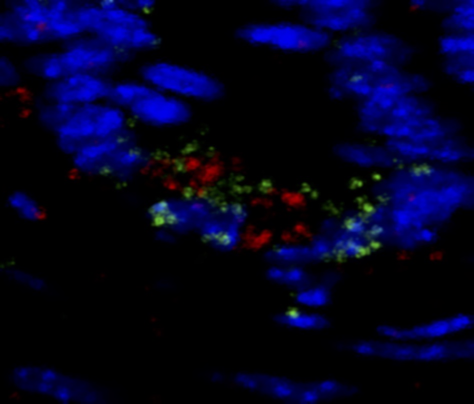Oxford Drug Design and CRUK Scotland Institute awarded MRC grant funding to advance novel cancer therapeutics discovery

The MRC National Mouse Genetics Network is delighted to announce the first project funded through our industry-academia collaborative Business Engagement Fund. More details about this exciting project are in the press release below.
Collaboration to use genetically engineered mouse models to validate a new approach to cancer therapy


Oxford and Glasgow, UK – 20th May 2024: The CRUK (Cancer Research UK) Scotland Institute and Oxford Drug Design, a biotechnology company with core expertise in AI drug discovery, have announced that their joint application for the MRC (UK Medical Research Council) National Mouse Genetics Network (NMGN) Business Engagement Fund has been awarded.
Oxford Drug Design is developing an innovative approach for the modulation of a validated cancer pathway fuelling disease progression. This approach would be clinically novel and bears the potential to display improved efficacy and lower toxicity than existing treatments.
The CRUK Scotland Institute has a long-standing track record in the development and implementation of sophisticated genetically engineered mouse models which they will deploy for the in-depth characterization of Oxford Drug Design’s novel small molecule anticancer compounds. Notably, research conducted at the CRUK Scotland Institute and others has highlighted these in vivo models as a unique predictive preclinical drug testing platform of clinical response to anticancer therapies in a subset of cancer patients, thus derisking subsequent studies in humans.
The newly announced joint studies aim to generate proof of principle data which will be of primary importance to the ongoing development of Oxford’s first-in-class compounds and provide the basis for further possible collaborations.
Dr Paul Finn, CSO of Oxford Drug Design commented: “We’re delighted that the potential of our novel anticancer compounds has been recognized with this award and are honoured to be working with CRUK Scotland Institute on this joint project. The models developed by CRUK SI are world-leading and the project will be of great value in validating our innovative approach. This is only the first of further opportunities to advance novel compounds emerging from our proprietary GenAI discovery platform.”
Dr. Alan D. Roth, CEO of Oxford Drug Design, added: “The combination of Oxford Drug Design’s novel anti-cancer small molecules with the distinctive and highly predictive in vivo platform of CRUK Scotland Institute has enormous potential for patients and their oncologists. We are delighted to be working directly with researchers at the CRUK Scotland Institute and are very grateful to MRC NMGN for funding this valuable collaboration”.
Dr. Andrew Campbell (Research Team Lead – CRUK Scotland Institute) and Dr. Valeria Pavet (Senior Translational Scientist – CRUK Scotland Centre): “We are very pleased to be able to bring our pioneering capabilities in anticancer compound characterization to support Oxford Drug Design accelerate their drug discovery efforts. The project is highly aligned with our core research interests and our mission of increasing the application of our science in a translational setting to contribute filling the gap between bench and bedside.”
Prof. Owen Sansom, Director of the NMGN, CRUK Scotland Centre and CRUK Scotland Institute highlighted: “The goal of the MRC NMGN Business Engagement Fund is to foster collaborations between businesses and academic research teams, boosting the exchange of knowledge and promoting the development of feasibility studies and/or pilot projects to lay the foundation for strong collaborative grant proposals that drive innovation. I am delighted that this Fund has allowed researchers at Oxford Drug Design and the CRUK SI to partner in the development of new and better options for the treatment of cancer patients and look very much forward to the outcome of their research”.